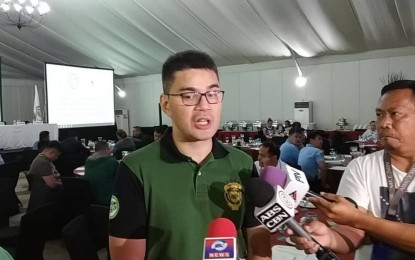
PDEA spokesperson Derrick Carreon. (PNA photo by Christopher Lloyd Caliwan)
MANILA -- The Philippine Drug Enforcement Agency (PDEA) on Wednesday launched another drug-free workplace advocacy program in Makati City, aimed at preventing business establishments and private estates from being used in illegal drug activities.
“We will replicate this effort nationwide and will pass it down to our regional and provincial directors because not only the National Capital Region has exclusive subdivisions, condos, bars, and other establishments. It is now a trend for illegal drug organizations and drug groups to use these establishments, thinking that these are safe havens for them and they won't be caught easily by authorities,” PDEA spokesperson Derrick Carreon, who represented Director General Aaron Aquino, told reporters on the sidelines during the launch at the Dusit Thani Hotel.
Carreon said this program aims to engage the management of these establishments, including security agencies, to implement their own drug-free workplace program, educate employees on the ill-effects of dangerous drugs, and conduct random drug tests for all their officers and employees as embodied in Dangerous Drugs Board Regulation No. 8, Series of 2003 or The Guidelines for the Implementation of a Drug-Free Workplace Policies and Programs for the Private Sector.
The activity was attended by city and barangay officials of Makati City, PDEA officers, as well the management, administrator, and security officers of hotels and condominiums.
During the launch, Carreon together with lawyer Cherry Canda Melodias, Makati Anti-Drug Abuse Council (MADAC) head, urged all business establishments in Makati City to implement a safe and drug-free environment in the workplace.
Among the topics discussed during the activity were the current drug situation and salient features of Republic Act 9165 (Comprehensive Dangerous Act of 2002); identification of clandestine drug laboratories, modus operandi and concealment methods used by drug syndicates; and drug abuse awareness and prevention inside the workplace.
Lt. Agnes Bueno, representing the Makati City police, said 12 out of 33 barangays have been cleared of drugs by the Regional Oversight Committee on Barangay Drug-Clearing Program as a result of the intensified anti-illegal drugs campaign in the city.
She said the cleared villages include Barangays Urdaneta, San Lorenzo, Bel-Air, Dasmariñas, Forbes, Pinagkaisahan, San Isidro, South Side, Sta. Cruz, Valenzuela, Poblacion, and Magallanes.
Among the conditions met by these barangays are the non-availability of drug supply; absence of drug transit/transhipment activity; absence of clandestine drug laboratory; absence of clandestine drug warehouse; absence of clandestine chemical warehouse; absence of marijuana cultivation site; absence of drug den, dive or resort; absence of drug pushers; absence of drug users and drug dependents; and absence of protectors, coddlers and financiers.
Other criteria included active involvement of barangay officials in anti-illegal drugs activities; active involvement of Sangguniang Kabataan representatives in maintaining the drug-liberated status of the barangay; and the existence of drug awareness, preventive education and information, and other related anti-illegal drugs programs and the existence of a voluntary and compulsory drug treatment and rehabilitation processing desk in the barangay.
In a statement sent to reporters, PDEA Director General Aaron Aquino said the program also aims to educate owners of hotels, bars, restaurants, condominiums, subdivisions, and warehouses to identify potential drug laboratories, drug dens, and warehouses used by drug syndicates in the manufacture and storage of illegal drugs due to less detection risk as shown by recent anti-drug operations of PDEA.
“One of the priorities of the program is to reintroduce and compel business owners to conform with the requirements of Dangerous Drugs Board (DDB) Regulation No. 8 Series of 2003 which mandates all private establishments employing 10 or more workers to formulate and implement a drug-free workplace program, including mandatory drafting and adoption of company policies against illegal drug use,” Aquino said.
He also urged lessors of warehouses, condominiums, and houses to regularly inspect their properties to prevent them from being used as drug laboratories and warehouses.
“PDEA has seen clandestine drug laboratories set up inside subdivisions and condominiums. Illegal drug transactions are actually happening inside hotel rooms, restaurants, and bars because illegal drugs can be exchanged discreetly. Some drug personalities were even billeted inside residential condominiums and apartelles, and use the place as drug dens where illegal drugs can be bought and used,” the PDEA chief pointed out.
“We are one in promoting a working environment free from the influence of illegal drugs in the public and private sectors as this allows personnel better health and safety, at the same time increasing productivity. This is a win-win situation for both employers and employees,” he added.
This anti-drug advocacy program was not mainly for the promotion of a drug-free workplace rather to stir awareness on the modus operandi used by drug syndicates such as using high-end subdivisions, hotels, and condominiums as drug dens, laboratories and warehouses to conceal their illegal activities.
Among the target establishments are hotels, restaurants, bars, condominiums and warehouses as the manufacture and proliferation of illegal drugs was being put up in subdivisions and condominiums, most recent is the dismantled large- scale clandestine laboratory in Oceanaire Luxurious Residences in Pasay City last September 25, 2018. (PNA)
